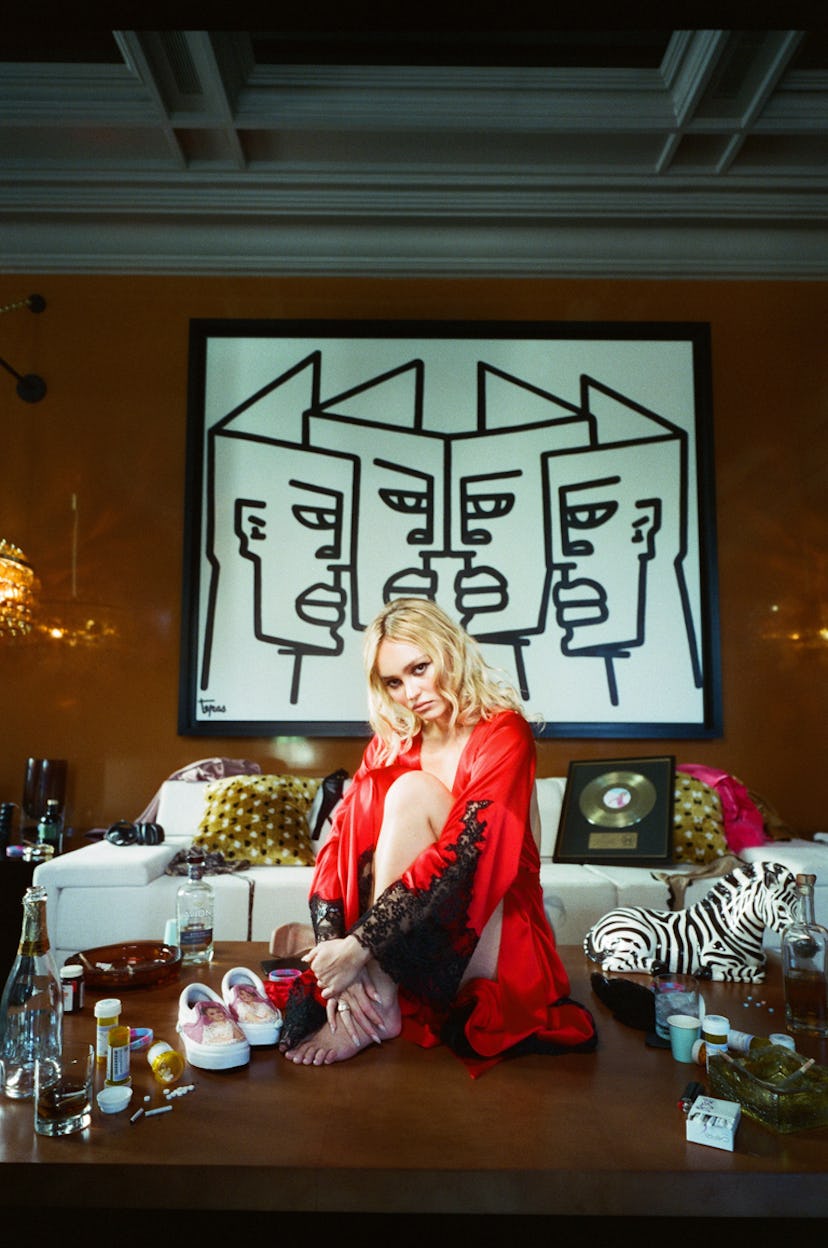The Idol Episode 1 Recap: A Little Bit of Side Boob, Under Boob, and Side Flank
Sam Levinson’s Euphoria follow-up attempts to make a name for itself among an audience that has already, for the most part, formed an opinion.

To be fair, The Idol had a tall mountain to climb when it premiered on Max on Sunday night. Those who, just a week prior, had spent 90 minutes watching fast talking, deal-making, and witty dialogue might have been hoping to replace the Succession-size hole in their lives. It’s possible they felt unsatisfied, though—because instead, they were delivered a hot, steaming, awkward plate of a nude Lily-Rose Depp, cringe lines, and an unconvincing Svengali.
To be fair (again): The Idol has been plagued with controversy pretty much since day one of production. The show’s cocreator and director, Sam Levinson, doesn’t have the best reputation, with rumors from Euphoria’s set swirling around every move he makes and every project he’s behind. Then there was the Rolling Stone article published in March, which detailed the departure of the show’s former director, Amy Seimetz, and the production’s subsequent fall from “a dark satire of fame and the fame model in the 21st century” to “the thing it was satirizing.”
I was very aware of this as I sat down to view the premiere episode, “Pop Tarts & Rat Tales,” on Sunday night, and I tried hard not to let these outside influences affect my viewing experience. And, absolutely, there were moments to enjoy throughout episode 1. Depp is definitely convincing as Jocelyn, treading water to stay afloat amid the tsunami around her. Alexa Demie’s brief cameo is a fun addition, and, even though I’d heard about her appearance beforehand, it nonetheless had me bouncing in my seat and pointing at the screen. Blackpink’s Jennie, too, is adorable as Jocelyn’s backup dancer and best friend, Dyanne. The scenes surrounding Jocelyn’s support staff have promise. Watching Dan Levy, Jane Adams, Hank Azaria, and Da’Vine Joy Randolph bounce off one another is fun—these are possibly the most intriguing moments of the premiere. The dialogue lacks a little, but it did make me yearn for a different kind of show, possibly the one Seimetz created before her departure—of the politics behind pop stardom, the give-and-take that occurs, the toll of such a toxic environment. That narrative peeks its head throughout “Pop Tarts & Rat Tales,” but is whacked down by plot points like the one depicting Jocelyn as a “human cum sock” when an explicit photo of her surfaces online.
There are other beats missing here. For one, how famous is Jocelyn? She is compared to Britney Spears, to Simone Biles, but it’s hard to tell if she’s more of an Ariana Grande or a Charli XCX (no shade to Charli, but her fan base is smaller). Is Jocelyn trying to recapture a level of success she experienced before her mother passed away and she had to cancel her tour, or is she attempting to reach that level for the first time? There’s a desire for context, in order to understand Jocelyn a bit better. In some ways, she feels seasoned, like when she’s speaking with Hari Nef’s Vanity Fair reporter, Talia, or being insistent on the nudity level in her album cover shoot. Other times, she’s a newborn fawn, navigating this world for what feels like the first time. If that’s the case, her complete infatuation with Abel Tesfaye’s Tedros would make a bit more sense. Halfway through the episode, he appears on the screen, and suddenly Jocelyn is enamored. Personally, I’m not seeing it. Tesfaye, who is, in my personal opinion, a very good-looking man, transforms into a sleazy, rat tail–adorned nightclub owner for the role. There’s nothing appealing about him at first glance, and he doesn’t exactly say anything to Jocelyn to win her over. A brief conversation about Prince, a good point about pop music, and all of a sudden, Jocelyn is caught in his web. But maybe that’s the point. She’s in a vulnerable place, still struggling after her mother’s death and desperate for direction from someone who doesn’t stand to benefit. He sees that and takes advantage. Isn’t that what men like this do?
Will I keep watching the show? Yes, because I have to in order to continue recapping it, but also because I am still intrigued. I want to know where Levinson and Tesfaye are taking us, and there are moments that make me hopeful. Jocelyn mentions wearing heels so she can be taller than Tedros, a hint that she’s playing the game, that she’s not completely resigned to be the victim. I want more of that, less of Tedros’s complete takeover of this woman. I knew to expect the explicit sex, the aggressive camera work, even the wince-inducing dialogue (the worst being when Jocelyn quips that she likes Tedros seeming to be “rapey”). But I’m hoping to be surprised by the points that weren’t discussed before, the ones I don’t know are coming. I would also like more Alexa Demie, but that’s a universal desire.